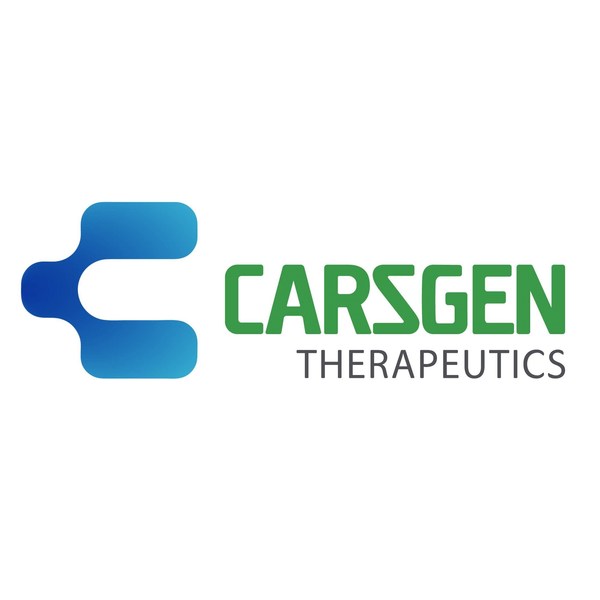CARsgen Presents First-in-human Results of GPRC5D Targeting CAR-T CT071 at EHA 2024
Sat, 15 Jun 2024 20:50:00 +0800
 |
SHANGHAI, June 15, 2024 /PRNewswire/ -- CARsgen Therapeutics Holdings Limited (Stock Code: 2171.HK), a company focused on innovative CAR T-cell therapies for the treatment of hematologic malignancies and solid tumors, announces that the initial results from the ongoing first-in-human study of CT071 have been presented at the 29th Annual Congress of the European Hematology Association (EHA).
The preliminary results of Phase I of CT071 (NCT05838131) were presented as a poster at the 29th EHA Annual Congress on June 14, 18:00 - 19:00 CEST, which was titled "First-in-human study of GPRC5D-targeted CAR T cells (CT071) with an accelerated manufacturing process in patients with relapsed/ refractory multiple myeloma (RRMM)".[1]
"Multiple myeloma is a common yet incurable hematologic malignancy with high unmet need. Despite the numerous recent advances, most patients relapse and become refractory to available therapies and therefore, novel therapies are needed. GPRC5D, a protein highly expressed on the surface of malignant plasma cells with limited expression on normal tissues, represents a promising target for treating multiple myeloma. CT071 is a fully human GPRC5D-targeting autologous second-generation CAR T-cell product manufactured using our expedited CARcelerateTM platform that shortens the manufacturing time to around 30 hours, supporting a shorter vein-to-vein time and younger T cells. The preliminary results of the ongoing study presented at EHA shows that CT071 has the potential to be the best-in-class GPRC5D targeting CAR-T therapy," said Raffaele Baffa, M.D., Ph.D., Chief Medical Officer of CARsgen Therapeutics. "We are excited about advancing CT071 and look forward to sharing future updates with the medical community."
As of February 28, 2024, 10 patients were dosed with CT071—7 patients at 1.0×105 cells/kg and 3 patients at 3.0×105 cells/kg. Among them, 80% had high-risk cytogenetics, 30% had one or more extramedullary plasmacytomas (EMD), and 40% were at R-ISS stage III. This was a heavily pre-treated population with a median of 5 prior lines of therapy, including 90% double-class refractory, 70% triple-class refractory, 40% penta-drug refractory, 50% having received autologous stem cell transplantation, and 20% had previously been treated with BCMA/CD19 dual-targeting CAR T cells. None of the patients on the study required bridging therapy due to rapid manufacturing turnaround.
The median follow-up at the time of data cut-off was 4.07 months (range: 2.8-7.4). There were no Grade 3 or higher cytokine release syndrome (CRS) events. No immune effector cell-associated neurotoxicity syndrome (ICANS) was observed. No adverse events of special interest or dose limiting toxicity (DLT) occurred. Four patients experienced treatment-related SAE, including pneumonia (n=1), decreased appetite (n=1) and thrombocytopenia (n=2), and all recovered.
The overall response rate was 90%, including 5 patients (50%) with stringent complete response (sCR), 2 patients (20%) with very good partial response (VGPR), and 2 patients (20%) with partial response (PR). All the 9 patients with evaluable MRD assessment at Week 4 achieved MRD negativity (10-6 threshold) ), including all 5 patients with sCR/CR. The pharmacokinetic analysis demonstrated robust cell expansion and persistence, with median Tmax of 14 days (range: 12-28) and median Cmax of 32280.5 copies/μg gDNA (range: 8372-106060).
About CT071
CT071 is a CAR T-cell therapy candidate developed utilizing CARsgen's proprietary CARcelerateTM platform targeting GPRC5D for the treatment of R/R MM or relapsed/refractory plasma cell leukemia ("R/R PCL"). An investigator-initiated trial (NCT05838131) is ongoing in China to evaluate the safety and efficacy of CT071 for the treatment of R/R MM or R/R PCL. Another investigator-initiated trial (NCT06407947) is ongoing in China for the treatment of newly diagnosed multiple myeloma (NDMM).
About CARsgen Therapeutics Holdings Limited
CARsgen is a biopharmaceutical company with operations in China and the U.S. and is focused on innovative CAR T-cell therapies for the treatment of hematologic malignancies and solid tumors. CARsgen has established a comprehensive CAR T-cell research and development platform, encompassing target discovery, innovative CAR T-cell development, clinical trials, and commercial-scale production. CARsgen has internally developed novel technologies and a product pipeline with global rights to address major challenges of CAR T-cell therapies, such as improving the safety profile, enhancing the efficacy in treating solid tumors, and reducing treatment costs. CARsgen's mission is to become a global biopharmaceutical leader that brings innovative and differentiated cell therapies to cancer patients worldwide and makes cancer curable.
Forward-looking Statements
All statements in this press release that are not historical fact or that do not relate to present facts or current conditions are forward-looking statements. Such forward-looking statements express the Group's current views, projections, beliefs and expectations with respect to future events as of the date of this press release. Such forward-looking statements are based on a number of assumptions and factors beyond the Group's control. As a result, they are subject to significant risks and uncertainties, and actual events or results may differ materially from these forward-looking statements and the forward-looking events discussed in this press release might not occur. Such risks and uncertainties include, but are not limited to, those detailed under the heading "Principal Risks and Uncertainties" in our most recent annual report and interim report and other announcements and reports made available on our corporate website, https://www.carsgen.com. No representation or warranty is given as to the achievement or reasonableness of, and no reliance should be placed on, any projections, targets, estimates or forecasts contained in this press release.
Reference
[1] J Du, et al. EHA 2024. 2024 Jun; Poster P941
 Homepage
Homepage